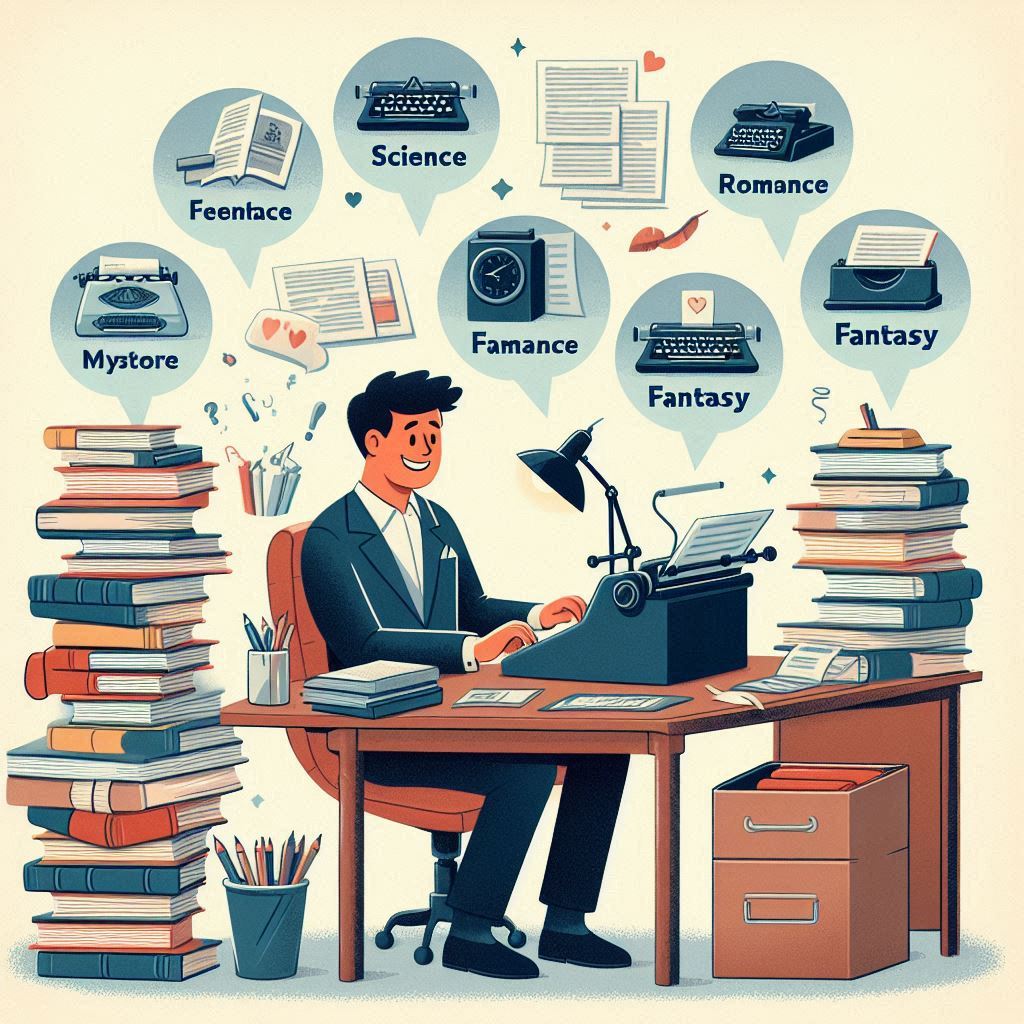Introduction
Exploring multiple genres can be a transformative experience for writers. It not only broadens your creative horizons but also enhances your writing skills and opens up new opportunities for reaching diverse audiences. In this comprehensive guide, we’ll delve into the benefits of writing in multiple genres and provide insights on how this practice can enrich your writing journey.
Understanding Genre in Writing
Definition of Genre
Genre in writing refers to the category or type of literature characterized by specific themes, styles, and conventions. Genres serve as a framework for both writers and readers, setting expectations and guiding the creative process.
Common Literary Genres
Some common literary genres include:
- Fiction: Novels, short stories, and flash fiction.
- Non-Fiction: Biographies, memoirs, essays, and self-help books.
- Mystery: Crime stories, detective novels, and thrillers.
- Fantasy: Epic tales, magical realism, and speculative fiction.
- Science Fiction: Futuristic, dystopian, and space exploration narratives.
- Romance: Love stories, contemporary romance, and historical romance.
- Horror: Gothic, supernatural, and psychological horror.
Enhancing Creativity Through Genre Exploration
Breaking Out of Comfort Zones
Writing in multiple genres forces you to step out of your comfort zone and experiment with new ideas and styles. This exploration can lead to unexpected creative breakthroughs and fresh perspectives on your writing.
Inspiring New Ideas
Each genre has its own set of conventions and tropes, which can inspire unique ideas and storylines. By writing across genres, you can blend elements from different categories to create innovative and original works.
Improving Writing Skills
Adapting to Different Styles
Each genre demands a different writing style and technique. Writing in multiple genres helps you develop the ability to adapt your voice and style to suit different narrative needs, enhancing your overall writing proficiency.
Expanding Vocabulary and Techniques
Exploring various genres exposes you to different vocabularies and literary techniques. This exposure can enrich your language skills and equip you with a diverse set of tools to enhance your storytelling.
Broadening Your Audience
Reaching Diverse Readers
Writing in multiple genres allows you to reach a broader audience. Different genres attract different types of readers, and by diversifying your writing, you can engage with a wider and more varied readership.
Increasing Marketability
A multi-genre portfolio makes you more marketable as a writer. Publishers and agents often look for versatile writers who can produce a range of works, increasing your chances of getting published and recognized in the literary world.
Building a Versatile Writing Portfolio
Showcasing Range and Flexibility
A diverse portfolio showcases your ability to write across different genres, demonstrating your range and flexibility as a writer. This versatility can make you more appealing to potential publishers, agents, and readers.
Attracting Different Publishing Opportunities
Writing in multiple genres can open up a variety of publishing opportunities. Different genres have different markets, and by diversifying your writing, you increase your chances of finding the right platform for your work.
Personal Growth and Satisfaction
Challenging Yourself
Writing in multiple genres challenges you to grow as a writer. It pushes you to learn new skills, experiment with different storytelling methods, and continually improve your craft.
Avoiding Burnout
Focusing on a single genre for extended periods can lead to creative burnout. Writing in multiple genres keeps your writing practice fresh and exciting, helping you maintain a passion for your craft.
Navigating the Challenges of Multi-Genre Writing
Balancing Different Genres
Balancing different genres can be challenging, especially if they require different writing techniques and mindsets. Effective time management and organization are key to successfully navigating multi-genre writing.
Overcoming Genre Bias
Some readers and publishers may have biases towards certain genres. Overcoming these biases involves producing high-quality work that showcases your versatility and skill across different genres.
Case Studies: Successful Multi-Genre Authors
Examples from Renowned Authors
Many renowned authors have successfully written in multiple genres. For example, Neil Gaiman has written fantasy, science fiction, horror, and children’s literature. Margaret Atwood has penned dystopian fiction, poetry, and literary essays.
Lessons Learned from Their Careers
Studying the careers of successful multi-genre authors can provide valuable insights and inspiration. These authors often credit their genre diversity with enhancing their creativity and expanding their readership.
Tips for Writing in Multiple Genres
Developing Genre-Specific Skills
To excel in multiple genres, focus on developing genre-specific skills. Study the conventions and expectations of each genre and practice writing within those frameworks to hone your abilities.
Managing Time and Projects
Effective time management is crucial for multi-genre writers. Create a writing schedule that allows you to dedicate time to each genre and project, ensuring that you can produce high-quality work across the board.
Common Misconceptions About Multi-Genre Writing
Myths and Realities
There are several misconceptions about writing in multiple genres, such as the belief that it can confuse readers or dilute your brand. In reality, many readers appreciate versatility and enjoy discovering new facets of their favorite authors.
Addressing Concerns
Address common concerns by focusing on producing high-quality work and maintaining consistency in your writing voice and style. This will help you build a strong, recognizable brand, regardless of genre.
FAQs About Writing in Multiple Genres
How to transition between genres?
Transitioning between genres involves studying the specific conventions and styles of the new genre and practicing writing within its framework. Reading extensively in the new genre can also help ease the transition.
Can writing in multiple genres confuse readers?
While some readers may prefer a specific genre, many appreciate an author’s versatility. Clearly labeling your works by genre can help prevent confusion and attract the right audience for each book.
What if I prefer one genre over others?
It’s natural to have a preferred genre. However, writing in multiple genres can still be beneficial. Focus on your favorite genre while occasionally experimenting with others to keep your writing fresh and dynamic.
How do I manage time when writing in multiple genres?
Effective time management involves creating a writing schedule that allocates dedicated time for each genre and project. Prioritize tasks and set specific goals to stay organized and productive.
Will writing in multiple genres affect my brand?
Diversifying your writing can enhance your brand by showcasing your versatility. Ensure consistency in your writing quality and voice to maintain a strong, recognizable brand across different genres.
Can multi-genre writing improve my chances of getting published?
Yes, writing in multiple genres can increase your marketability and open up various publishing opportunities. Publishers and agents often seek versatile writers who can appeal to a broad audience.
Conclusion
Writing in multiple genres offers numerous benefits, from enhancing creativity and improving writing skills to broadening your audience and increasing marketability. Embracing multi-genre writing can lead to personal growth, greater satisfaction, and a more versatile and appealing writing portfolio. So, take the plunge and explore the rich and diverse world of multi-genre writing. Your creative potential awaits!



